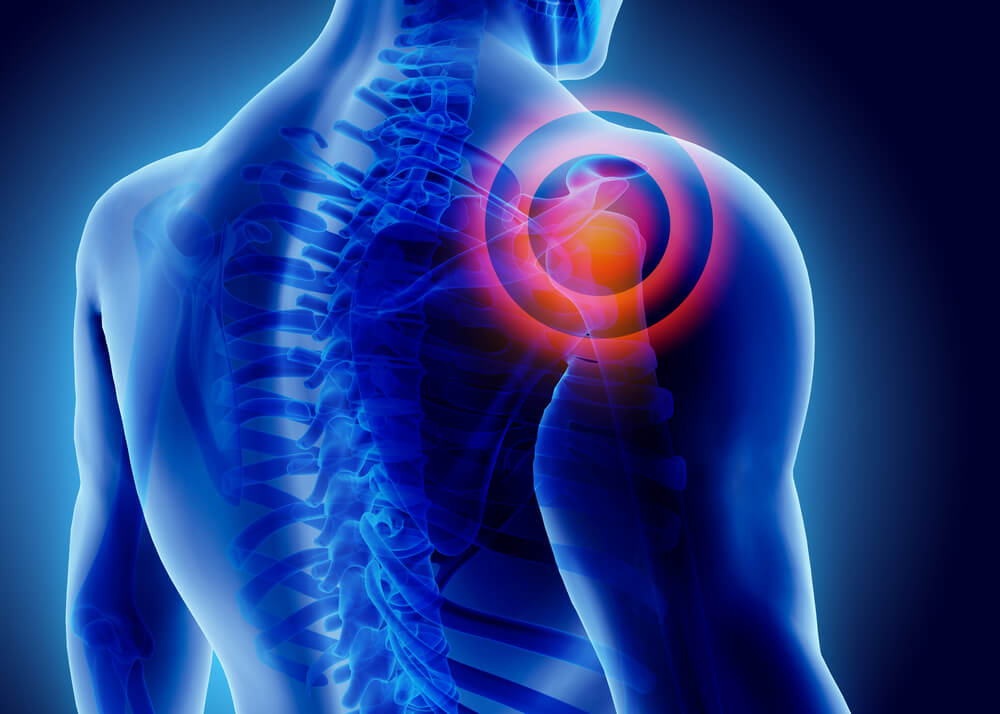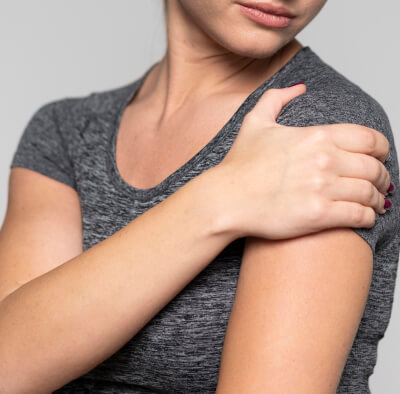
DR. ONG KEE LEONG
Shoulder Labrum Tear
A shoulder labrum tear can cause sharp pain and affect the quality of your life. Dr. Ong will perform a clinical evaluation of the injury and recommend a personalised treatment suited to your needs.
Book AppointmentWhat Is Shoulder Labrum Tear?
The shoulder labrum is a piece of cartilage located in the shallow socket (glenoid) of your shoulder blade (scapula), which helps to provide protection and stability in the shoulder joints.
A torn shoulder labrum occurs when any area of the labrum that is connected to the glenoid is damaged.


Types of Shoulder Labrum Tears
There are different types of shoulder labrum tears, including the following:
- SLAP tears – A SLAP (superior labrum from anterior to posterior) tear occurs above the middle of the glenoid. It is common amongst athletes who consistently engage their shoulders in overhead movements, such as volleyball players, tennis players and baseball pitchers.
- Bankart tears – Bankart tears occur in the lower half of the glenoid socket, commonly occurring in younger patients with shoulder dislocations.
- Posterior labrum tear – This type of shoulder labrum tear occurs in the back of the shoulder joint.
What Causes It?
- Overuse of shoulders – Repetitive shoulder movements
- Direct trauma – A direct and forceful blow to the shoulder


What Are the Symptoms?
Some of the symptoms of shoulder labrum tear may include:
- Intense sharp pain in the shoulder
- A catching or locking sensation
- Significant loss of strength and mobility of your shoulder
- A general sense of instability or a feeling that your shoulders may give way
How Is It Diagnosed?
As the labrum cartilage is located deep inside the shoulder joint, a physical examination alone is usually unreliable and insufficient to confirm the diagnosis.
Therefore, a shoulder specialist will perform an MRI scan to have a more detailed view of the shoulder joints to identify the damage. However, as there are different labrum tears, sometimes an MRI scan is not enough to detect certain tears, such as a SLAP tear.
Instead, arthroscopic surgery may be performed, which is a minimally invasive surgery that involves creating small incisions on the shoulder and inserting a tiny fibreoptic scope to examine the shoulder joints.
How Can It Be Treated?
The treatment options depend on the severity and type of tear. There are generally two types of methods: Non-surgical and surgical treatment.
Non-Surgical Methods
These methods may include:
- Physical therapy. Dr. Ong may recommend simple stretching and strengthening exercises.
- Home remedies. Home therapy may be advised if the tear is not severe.
Surgery
In severe labrum tear cases, surgery is recommended. A minimally invasive arthroscopic surgery will be performed to remove the damaged portion of your labrum.
How Long Will It Take to Recover After Surgery?
The recovery period differs for each person, depending on the severity of the labrum tear and the extent of the surgery.
However, it will generally take about 9 to 12 months to heal completely after surgery. After the day of your surgery, you will likely be advised to wear an arm sling for about 3 to 6 weeks to immobilise the shoulder and avoid further injuries.
Why Do Patients Choose Dr Ong Kee Leong?
- Dr. Ong Is Passionate In Sports, Giving Him A Deep Understanding Of Sports-Related Injuries And How They Can Be Treated
- Fellowship Trained Surgeon With 15 Years Of Experience In Orthopaedic Conditions
- Personalised And Professional Approach To Deliver High-Quality Orthopaedic Care Based On The Most Up-To-Date Literature
- Detailed Aftercare Plan To Ensure Smooth, Long-Term Recovery
- Problem-Oriented, Well-Organised and Individualized Treatment Plans Catered To Your Specific Needs
- Specialist In The Management Of Sports Injuries And Degenerative Conditions Of The Shoulder And Knee Joints
- Knowledgeable And Pleasant Clinical Staff To Assist You With Your Every Need Detailed Aftercare Plan To Ensure
- Our Care Is Conveniently Accessible At Mount Elizabeth Novena and Farrer Park hospital
- Minimal Waiting Time For Initial Consultation
- Assistance With Medical Claims (e.g. Medisave & Integrated Shield Plans)
“At our clinic, we generally try to explore non-surgical treatment such as activities modification, physiotherapy and orthotics before recommending invasive intervention options.”
Dr. Ong Kee Leong


Featured In:

About Dr. Ong Kee Leong
Senior Consultant, MBBS (Singapore), MMed (Ortho), FRCSEd (Ortho)
Dr. Ong Kee Leong is a fellowship-trained orthopaedic surgeon. He subspecializes in shoulder and knee, foot and ankle, hand wrist and elbow surgeries, arthroscopic sports surgery, and the management of sports-related injuries.
He has been registered with the Singapore Medical Council as a specialist in Orthopaedic Surgery since 2011.
- MBBS, National University of Singapore (NUS) Faculty of Medicine 2001
- Member of the Royal College of Surgeons of Edinburgh 2007
- Master of Medicine in Orthopaedic Surgery (NUS) 2007
- Fellow of the Royal College of Surgeons of Edinburgh in Orthopaedic Surgery 2011
- Health Manpower Development Plan (HMDP) Scholarship, Ministry of Health 2012-2013:
- Sports Surgery and Arthroscopy in Germany (Hannover)
- Adjunct Assistant Professor, Lee Kong Chian School Of Medicine, Nanyang Technological University
- Senior Clinical Lecturer, Yong Loo Lin School of Medicine, NUS
Awards & Teaching
- Dr. Ong had received numerous awards such as Best Service and Eastern Health Alliance Caring (Gold) Awards.
- He also has an interest in clinical research and has written papers in multiple peer-review journals. As a Core Faculty of Singhealth Orthopaedic Surgery Residency Program, he oversees the training of junior orthopaedic surgeons.
- Regularly invited to teach local and regional surgeons in Shoulder and Knee Surgery Courses.
- He is a recipient of multiple teaching awards including the Singhealth Residency Outstanding Faculty Awards from 2014-2016 and Changi General Hospital Outstanding Educator Awards 2015-2016.
Featured In:

Billing & Payment
Consultation fees are charged based on length of consultation, and start from SGD$150 (within 30 minutes).
Modes of Payment
We accept the following modes of payment:
- Cash
- PayNow & PayLah
- All major Credit Cards
If you are insured and would like to use a Letter of Guarantee (LOG) from the major insurers in Singapore, please contact us and our friendly clinic staff will assist you and provide more information if required.
Can I Claim Through My Medisave Account? (For Singaporeans and PR)
Yes, you can. Our Clinic is an accredited day surgery clinic by the Ministry of Health. Singaporeans and Permanent Residents may use their Medisave for eligible orthopaedic inpatient procedures and hospitalizations.
The exact amount would depend on the complexity of the procedure. If you have any enquiries, feel free to speak to our friendly clinic staff about using your Medisave account.
Integrated Shield Plans (Singaporeans and PRs)






Yes, patients who have purchased Integrated Shield plans with riders for co-insurance and deductibles will be able to use them in our clinic for eligible procedures. For more information, contact us to find out if your procedure is claimable.
The 6 Approved Integrated Shield Insurers are:
- NTUC Income’s IncomeShield and Enhanced IncomeShield
- American International Assurance International Co’s (AIA) HealthShield Gold
- Great Eastern Life Assurance Co’s SupremeHealth and SupremeHealth Plus
- Aviva Ltd’s MyShield
- Prudential Assurance Co’s PRUShield
- AXA Shield

